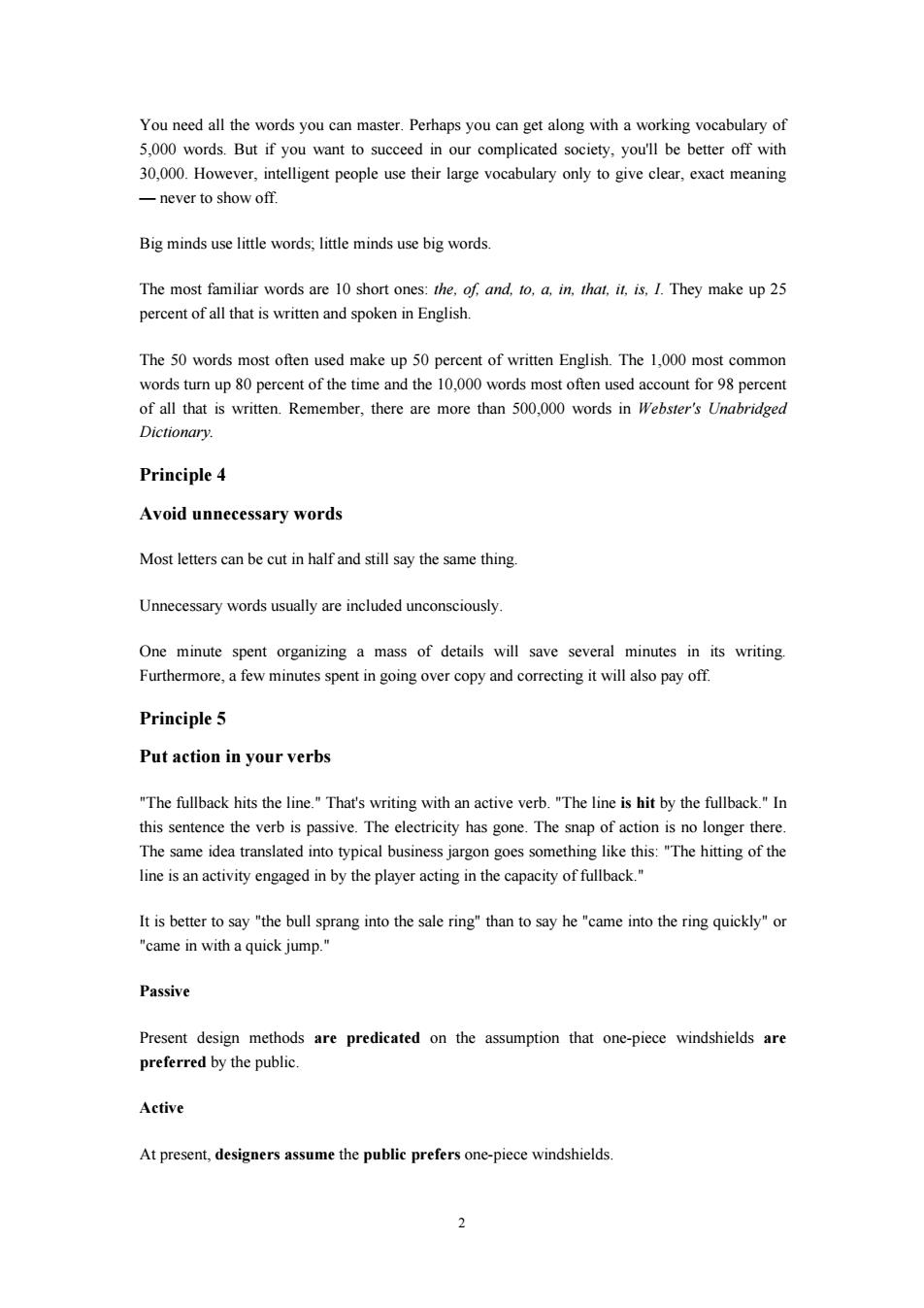正在加载图片...

You need all the words you can master.Perhaps you can get along with a working vocabulary of 5,000 words.But if you want to succeed in our complicated society,you'll be better off with 30,000.However,intelligent people use their large vocabulary only to give clear,exact meaning 一never to show off. Big minds use little words;little minds use big words. The most familiar words are 10 short ones:the,of,and,to,a,in,that,it,is,I.They make up 25 percent of all that is written and spoken in English. The 50 words most often used make up 50 percent of written English.The 1,000 most common words turn up 80 percent of the time and the 10,000 words most often used account for 98 percent of all that is written.Remember,there are more than 500,000 words in Webster's Unabridged Dictionary Principle 4 Avoid unnecessary words Most letters can be cut in half and still say the same thing. Unnecessary words usually are included unconsciously. One minute spent organizing a mass of details will save several minutes in its writing. Furthermore,a few minutes spent in going over copy and correcting it will also pay off. Principle 5 Put action in your verbs "The fullback hits the line."That's writing with an active verb."The line is hit by the fullback."In this sentence the verb is passive.The electricity has gone.The snap of action is no longer there. The same idea translated into typical business jargon goes something like this:"The hitting of the line is an activity engaged in by the player acting in the capacity of fullback." It is better to say "the bull sprang into the sale ring"than to say he "came into the ring quickly"or "came in with a quick jump." Passive Present design methods are predicated on the assumption that one-piece windshields are preferred by the public. Active At present,designers assume the public prefers one-piece windshields. 22 You need all the words you can master. Perhaps you can get along with a working vocabulary of 5,000 words. But if you want to succeed in our complicated society, you'll be better off with 30,000. However, intelligent people use their large vocabulary only to give clear, exact meaning — never to show off. Big minds use little words; little minds use big words. The most familiar words are 10 short ones: the, of, and, to, a, in, that, it, is, I. They make up 25 percent of all that is written and spoken in English. The 50 words most often used make up 50 percent of written English. The 1,000 most common words turn up 80 percent of the time and the 10,000 words most often used account for 98 percent of all that is written. Remember, there are more than 500,000 words in Webster's Unabridged Dictionary. Principle 4 Avoid unnecessary words Most letters can be cut in half and still say the same thing. Unnecessary words usually are included unconsciously. One minute spent organizing a mass of details will save several minutes in its writing. Furthermore, a few minutes spent in going over copy and correcting it will also pay off. Principle 5 Put action in your verbs "The fullback hits the line." That's writing with an active verb. "The line is hit by the fullback." In this sentence the verb is passive. The electricity has gone. The snap of action is no longer there. The same idea translated into typical business jargon goes something like this: "The hitting of the line is an activity engaged in by the player acting in the capacity of fullback." It is better to say "the bull sprang into the sale ring" than to say he "came into the ring quickly" or "came in with a quick jump." Passive Present design methods are predicated on the assumption that one-piece windshields are preferred by the public. Active At present, designers assume the public prefers one-piece windshields